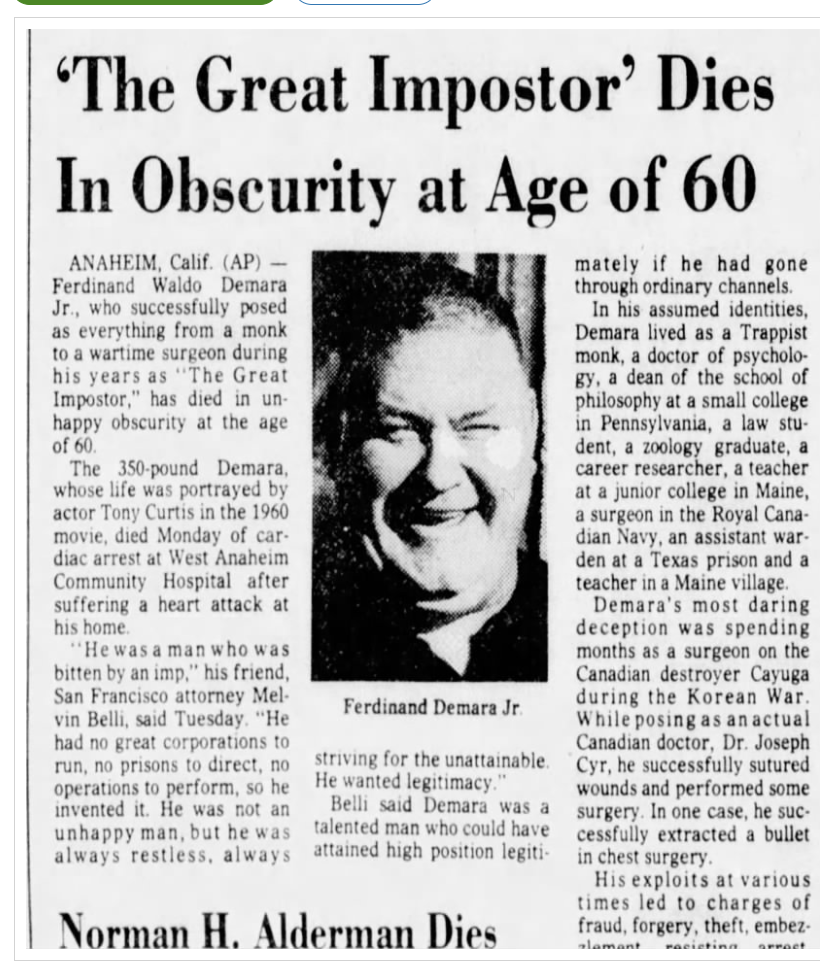I missed this back when it was current news, probably because I was still watching Disney movies when Tony Curtis was playing the man, but it remains an amazing tale.
As a young man in the 1940s and ’50s, Massachusetts native Ferdinand Waldo Demara jumped from career to career and calling to calling. He was, at various points, a monk, a psychologist, a college professor, a naval surgeon, a prison warden and a high school teacher in Maine.
He was not qualified in any way to hold any of those positions. But through sheer charisma, colorful storytelling, careful manipulation and a litany of false identities, Demara was able to worm his way into all of them. He was one of the greatest impostors in American history — until he was unmasked for the final time and arrested on a tiny coastal island in Penobscot Bay.
Demara was born in Lawrence, Massachusetts, in 1921. At age 16, Demara struck out on his own; a lifelong devout Catholic, he bounced between a Trappist monastery and Catholic boys homes. It was when he enlisted in the U.S. Army in early 1941 he found his true calling: as an impostor.
Weeks after enlisting, Demara “borrowed” the name of an Army friend and went AWOL, before re-enlisting — this time in the U.S. Navy — a week after the attack on Pearl Harbor. There, he served on a destroyer in the North Atlantic and was briefly sent to military hospital school before he once again, as he told Life Magazine in 1952, “left the service temporarily.”
Demara bounced between monasteries in Kentucky, Arkansas and Iowa, claiming to be a man named Robert L. French, who had a Ph.D. from Stanford University. He eventually landed at DePaul University in Chicago, and later taught at other Catholic colleges around the country.
As Demara later noted in his biography, his approach to assuming false identities and convincing people of his qualifications was based on two rules. The first, as he said, was that “in any organization there is always a lot of loose, unused power lying about which can be picked up without alienating anyone.” The second was that “if you want power and want to expand, never encroach on anyone else’s domain; open up new ones.”
The first time the jig was up for Demara was in 1946, when FBI agents arrested him for desertion from the U.S. Navy during a time of war. He was court-martialed and sentenced to six years in prison, though he only served 18 months. When he was released in 1948, Demara took on the name of Cecil Hamann, a real-life biology professor in Kentucky, and in 1949 joined the seminary of the Brothers of Christian Instruction in the Maine town of Alfred.
In Maine, Demara invented an entire backstory for his Hamann character, including that he’d traveled throughout India, Tibet and Japan, according to the 1952 Life profile. The brothers, according to Demara, “rolled out the red carpet” for him, and with his help founded LaMennais College, a junior college in Alfred. LaMennais College eventually moved to Ohio, where it still exists as Walsh University. No mention of Demara is on the school’s website.
In 1950, Demara went to New Brunswick to receive more training before being ordained. There, he met a local doctor, Joseph Cyr, to whom Demara quickly became close. When Demara returned to Maine, he submitted his resignation to the seminary and headed back to New Brunswick, where in 1951 he enlisted in the Royal Canadian Navy as Dr. Joseph Cyr, a naval surgeon, to serve during the Korean War.
Demara had never operated on anyone and had no medical training. At a naval hospital in Nova Scotia and on board a ship in Korea, Demara completed at least 17 surgeries, ranging from pulling teeth to removing a bullet from a soldier’s chest. According to Demara, he operated on instinct and good guesses, and for a particularly tricky lung removal procedure, he used news coverage of a similar surgery undergone by King George VI of England as his reference.
Demara’s successes were reported widely in the news. While his fellow soldiers grew to love “Dr. Cyr,” Demara could only keep up the charade for so long. In late 1951, the real Dr. Cyr read about his fictional counterpart’s medical exploits overseas, and the jig was, once again, up. Demara escaped the situation without any prison time. The Canadian government deported him, and Demara went home to Massachusetts to plot his next moves.
After laying low for a few years, Demara took on the name Ben W. Jones, and with a fake southern accent, in 1954 began working as a prison guard in Texas, where he eventually became warden of a maximum security wing. A prisoner noticed Demara’s picture in an old Life Magazine and reported him to authorities, but before they could catch up with him, Demara had already fled and headed east: first, to New York, and then to the Maine island of North Haven.
There, under the alias Martin Godgart, in September 1956 Demara began teaching English at the island high school. He quickly endeared himself to his students and the community at large. A 1997 Bangor Daily News story said he threw himself into town projects, led extracurricular activities for students and regaled townsfolk with increasingly wild stories from his colorful past. A fellow teacher told the Bangor Daily News that Demara was “one of the finest teachers North Haven has ever obtained.”
Those stories began to sound fishy to some folks around North Haven. A few local residents devised a plan to obtain Mr. Godgart’s fingerprints off a beer glass, and sent them off to Augusta to be tested against federal records. In February 1957, the results came back: their gregarious new teacher and Ferdinand Waldo Demara were one and the same.
On Valentine’s Day 1957 two Maine State Police detectives arrived in North Haven via a Coast Guard cutter. They waited in the parking lot of the school until Demara arrived, and reportedly, upon seeing them, Demara said “What took you so long to get here?”
Demara pled guilty to a charge of cheating by false premises by not having a Maine teaching license, and was sentenced to two months probation. Though it appeared his imposter years were over, Demara — always one to make hay while the sun shone — sold his story to author Robert Crichton, who in 1959 published the book “The Great Impostor,” a bestseller that told a slightly embellished version of Demara’s life story.
“The Great Impostor” was turned into a 1961 Hollywood movie of the same name, directed by Richard Mulligan and starring Tony Curtis as Demara. The real Demara made appearances on television, including on “You Bet Your Life” with Groucho Marx, and “Take a Good Look” with Ernie Kovacs. He moved to California and attempted an acting career, becoming friends with Hollywood personalities including actor Steve McQueen, with whom he remained close for the rest of his life.
By the mid-1960s, his fleeting fame had ended, and Demara returned again to two of the professions he’d most often pretended to be qualified for: teaching, and the priesthood. Most of his time was spent as a chaplain, including at a hospital outside Los Angeles. According to an obituary published in the New York Times after his death in 1982, he never enjoyed living under his real name.
























